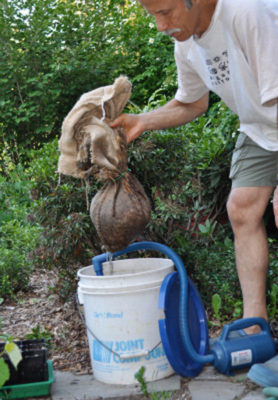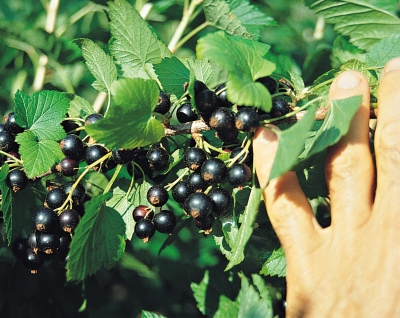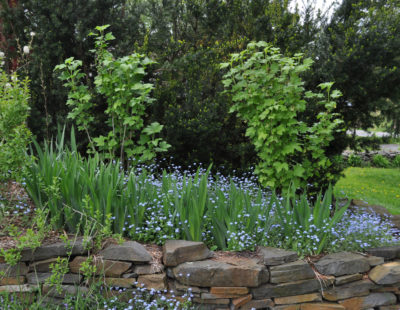COMPOST TEA: SNAKE OIL OR ELIXIR? BLACK CURRANTS…
Tea For Plants?
Has your garden had its tea this morning? Tea is all the rage for plants and soils these days. Compost tea. And not just any old compost tea, but tea you steep in water that’s aerated just like an aquarium.
Compost tea steeped the old way, by hanging a burlap sack of compost in a bucket of water for a few days, was one way to provide a liquid feed to plants. The liquid feed wasn’t particularly rich but did provide a wide range of nutrients that leached from the compost, and was convenient for feeding potted plants.
The new, aerated compost teas are billed as an efficient way to transfer beneficial microorganisms from compost into the soil or onto plant leaves. After all, spraying a little tea is less work than pitchforking tons of compost. In the soil, the little guys can spread their goodness, fighting off plant diseases and generally making plants healthier. Or so goes the logic and the promotional material.
Aerated compost tea (ACT) is big business these days, with people selling compost tea, compost tea brewers, and services for testing compost teas. Compost tea is more than big business; it’s bordering on religion (as anyone who criticizes compost tea soon finds out).
In fact, aerated compost tea is not the panacea it’s trumped up to be. Many independent studies have found the tea to be of no benefit, or even detrimental. Occasionally, human pathogens have been found lurking in compost tea.
In The Interest Of Science
I have a friend who believes in compost tea, so in the interest of science I agreed, on his urging, to try it out. To make sure any lack of efficacy could not be blamed on the tea itself, he sent me some compost, a brewer, and instructions for brewing and application. Interestingly, he told me not to try it out in my vegetable garden, because my garden was “too organic”(!)
Long story short: I applied tea to my lawn and to some vegetables in a relatively poor soil at a local farm, and the result was . . . (drum roll) . . . nothing, nada, rien, zip.
Tea Doesn’t Make Sense
All the buzz about compost tea bypasses the fundamental question of why compost tea would limit plant disease when sprayed on plant leaves? The theory goes that the good microorganisms colonize leaves to displace and/or fight off the bad guys.
Compost tea contains some of the microorganisms from the compost that made the tea. These microorganisms are normally found in soils and, of course, composts. But why, evolutionarily speaking, would these microorganisms provide any benefit on plant leaves, for disease control or any other purpose? Furthermore, these microorganisms evolved in a dark, nutrient and moisture rich environment. Why would they survive on a sunny, dry, nutrient poor leaf? The same goes for soils: If the soil has the right environment for a particular set of microorganisms, they generally are there; apply microorganisms to a soil lacking the needed environment and those microorganisms cannot survive.
Occasional research papers report positive effects of compost tea for thwarting plant diseases. I contend that if you spray just about anything on a plant leaf and measure enough plants closely enough, you’ll turn up some measurable response to the spray. That response might be very transitory and very small, but, with the right equipment or instrumentation, you’ll measure some effect. Whether that effect is of biological or practical significance is another story.
With that, I suggest someone begin a series of experiments to see the effect on plant diseases of spraying — say — milk solutions on plant leaves. Wait! A web search tells me that milk sprays have been tested and are, in fact, effective in controlling plant viruses, powdery mildew, and other diseases. In contrast to compost tea, which provides microorganisms but little of the food they need to survive, milk provides a smorgasbord of nutrients to whatever microorganisms tag along for the ride.
On the basis of the evidence, I’d go with milk rather than tea for my plants. And I’ll take my milk without tea.
Black Currants, Mmmmm
Moving on to something noncontroversial, my first black currants of the season ripened June 26th this year. Come to think of it, black currants may not be noncontroversial. Black currants have a strong, very

Belaruskaja black currants
distinctive flavor, loved by some people, abhorred by others. The flavor starts out refreshingly tart as your teeth break the skin and then becomes sweeter and cooling, with a rich, resiny flavor, as you continue.
I count myself among the lovers of black currants, right up there
with blueberries in my book. Black currants earned a whole chapter in my book, Uncommon Fruits for Every Garden. Although humans are divided on whether or not they enjoy fresh black currants, pretty much everyone loves the fruit concocted into jams and baked goods. They also flavor the liqueur cassis, I’ve used them to flavor beer.
Let’s be clear about the fruit in question. Black currants are not the same fruit as “dried currants.” Those currants are raisins made from dried Black Corinthe grapes, a name which was bastardized to “black currant.”
Black currants are borne on medium-sized bushes whose leaves, when brushed against, emit a strong, also resiny aroma. The leaves are sometimes brewed into tea — for humans, not plants.


Thanks Lee for helping to reveal this myth. More good work on your part.
Thanks. And good to hear from you, Robert.
I do love the “dried” black currants in some recipes. I’ve never had real and fresh black currants. What birds, if any, eat them?
No birds eat my black currants, but the situation could be different elsewhere.
Thanks for taking the time to do this experiment and to send out an update.
“why, evolutionarily speaking, would these microorganisms provide any benefit on plant leaves, for disease control or any other purpose ?”
======================
Well, dumping the term evolutionary from the topic, there is research and actual products manufactured by Plant Health Care Inc. (PHC) & even Monsanto which use a re-engineered E-coli bacteria which is utilized as a solution for spraying on plant leaves. This E-coli tricks the plant into reacting to an attack by responding through an epigentic trigger which further switches on the plant’s immune system. The technology is called Harpin Protein Technology which has been around a while. The idea behind some compost teas is that these microbes may be able to trigger such a response. For myself, I’ve never used compost teas other than mixing up a natural liquid mix for potted plants and seedling flats and one gallon containers to provide a measure of nutrients for some nutritional health prior to outplanting. also I have used this also for house plants which make applying soild muclch or compost for feeding almost impossible.
I understand many blogs often have articles which criticze certain practices as myths and they are the myth busters (Garden Professors Blog as an example), but frankly I don’t care what other folks do to their own yard and if it appears to provide a healthy landscape or garden. If it makes them happy then good for them. When I was a landscape supervisor, I never used compost teas ever on an industrial basis. The only time I would use such things is with large potted plants around the pool deck area and offices where huge decorative plant container pots were used.
I did write two posts about the Garden Professors Blog who bashed Harvard Yard for making their own compost and recipes for aerated compost teas blends for their massive lawns which allowed them to responsibly recycle kitchen waster and other organic materials and stop spending 10s of 1000s of dollars a year on agro-chemical synthetic inputs. Their lawns are beautiful and they have eliminated most pest problems. My reaction is good for them. Other commercial entities like Golf Courses and Botanical Gardens have done exactly the same thing and stopped buying synthetics. Again, good for them. The Washington State University soil science lab did a recorded video on compost tea research and it was very well done. They were neutral and only revealed what practices were going on out there with compost teas. T&hey even referenced the use of the teas as a plant immune system booster and referenced the Harpin Technology I mentioned above. Unfortunately the Garden Professors slammed these two ladies (a soil scientist and graduate student) for putting on this presentation. Seriously, there was nothing wrong with the compost tea presentation, but they are obsessed with conventional synthetic science-based technology which is what industrial agriculture science is for. Anyway, just my two cents.
Thanks for your thoughtful comments. Yes, anybody can do whatever they want in their gardens and, if it makes them happy, so much the better. But some gardeners would like to go to the next level, and put their time and energy into things that actually do make for a better garden. What kinds of things are these? Things that have been rigorously tested and shown to be beneficial; things that can be deduced on the basis of present knowledge. (Of course, lots of “alternative fact” out there not, in agriculture as well as politics.) Harpin technology and compost teas (except as source of nutrients) have not been shown to be consistently beneficial.
BTW, here is the explanation for Harpin Technology from the PHC website if that helps
http://www.planthealthcare.com/technology/harpin/
That website is, basically, an advertisement for a commercial product. For a nonbiased evaluation of harpin technology, see https://puyallup.wsu.edu/wp-content/uploads/sites/403/2015/03/harpin.pdf. And for a supporting article about harpin, see http://citeseerx.ist.psu.edu/viewdoc/download?doi=10.1.1.335.9117&rep=rep1&type=pdf. I’ve tried harpin (as commercial product Messenger) and, unsurprisingly, found no benefit. Works in theory; not in practice, at least under most natural conditions.
Could be garbage in = garbage out. It seems to me that the efficacy of compost tea is a function of the quality of the compost being used.
If you are please with the results that you get from the compost that you use in your garden, why not brew a tea with it and use it as a soil drench when you water?
I think better use of the compost would be made from just applying to the soil. Then you get the bulk (carbon) and everything else in the compost, not just what can be leached out by steeping it.
I agree with you Lee, sounds some gardeners are reluctant to use those teas afraid of getting pathogens or to be worth the efford to buble some some water for few days… If you add molasses and ewc in the tea along with alfafa and brewer´s yeast you are adding nutrients with the tea and another thing, is aerated with 50/lm pumps you get a well oxigenated water which is a good thing to feed to your roots, also same as water, helps dilute the mulch nutrients into the plants.
I prefer to see the tea as a way to luxury water your plants with nutrients and array of bacterias to improve the soil.
I think the term tea is wrong and shouldnt be used
But a lot of effort unless it’s of more assured benefit. Plants grow well in Nature and they don’t get compost tea.
I am a zone above you in Ausable FOrks, NY…and have 5 currant bushes: 2 Red Lakes, 2 Consort and 1 Titania from St Laurence Nursery. They are 5 years old now, and yielding gallons from each bush!!! I too love currants, and have made jam each year. This year I am making a currant vinegar shrub, and also crushing them and soaking them in brandy. I hope to have a flavorful decoction by winter time!! I freeze them flat in freezer bags for use in cobblers and crisps as well as over Muesli. I too LOVE currants!!
Lee,
Thanks for writing about compost tea. There is so much nonsense floating around in the gardening world that shooting down unsupported nostrums is like playing wack-a-mole.
Black currants are wonderful. In France, in Nuits Saint-George in the Burgandy region, Vedrenne makes Creme de Cassis. It is so good that if you can get your hands on a bottle you won’t tell your friends, because then you’d have to share it.
Thanks for your posts. Black currant juice is one of my favorite things. I have been reading your book “Grow Fruit Naturally” and you recommend Bioloruskaja black currents. I can’t find plants for purchase anywhere online. Do you have a source that you recommend? I live in hardiness and heats zones that approximate 5-7.
You probably can’t find it because you spelled it wrong. It’s Belaruskaja.